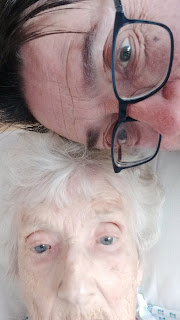Thus ends Hans Christian Andersen's fairy tale The Nightingale. The Chinese ruler has been at death's door, but the exquisite songbird he so easily rejected for a mechanical version has vanquished the grim reaper (paper cut by HCA reproduced in my Penguin edition pictured below).
I thought of it when, after two nights of delirium and distress, my nearly-93-year-old mother greeted me on the third visit, back to her old self. She'd been admitted to Epsom Hospital with Covid, the return of her COPD and pneumonia in the right lung. The consultant thought she might decline further. But she rallied, only to get another infection three days later. This time she wasn't beside herself, but still mildly delirious. A second course of antibiotics and more rehydration seem to be doing the trick and, though very tired and barely able to keep her eyes open, she's been lively in all her responses and very much engaged with everything that's going on. I chose the top image because she has yet to be reunited with her dentures, but I decided that the below photo is also fine.
Stravinsky set the Andersen tale in singular fashion, and earlier I'd been reminded of the Bedlam scene in The Rake's Progress, where Anne Trulove calms the troubled spirits of the inmates. The healing power of music struck me twice: on the first visit, straight from landing at Gatwick airport, where I found the finale of Mozart's Clarinet Concerto and the slow movement of Dvořák's Sixth Symphony on my laptop player. She went quiet immediately. And on the second visit, when she seemed worse, I'd downloaded my selection of Mozart slow movements and again, her head off the pillow, me cradling it as best I could, she shut her eyes, occasionally opening them, but otherwise perfectly still, for a full 50 minutes. This was the first track.
Later it was singing along to the ripostes of 'Who Wants To Be A Millionaire?' and the 'hoy's of 'The Deadwood Stage'. We've also been quite interactive with TV; there are quiz shows hosted, to my surprise, by Graham Norton and Stephen Fry, but I also discovered an amazing presenter who's not only very sympathetic but really knows his stuff, wildlife cameraman Hamza Yassin, whom my mother recognised, it transpired, as a winner of 'Strictly Come Dancing'.
At first it was difficult persuading the staff that my ma isn't in the advanced stages of dementia - over the four months in Greenacres Care Home, she may forget what she's just said, and some details, but I thought she was better when among company. So we showed them photos of how she'd been right up to Boxing Day, when Sara visited with her daughter and grandson Lenny.
And on the 18th, the day before we left for Italy, thinking all was going just fine, J and I took her to lunch at Prezzo, a short wheelchair ride away from the home. She loved the scarf I'd got her, adorned with flower motifs by Palestinian weavers (see the excellent facilitators, ODE Collective, here).
Today I spoke to the consultant and agreed with most of what he was saying, except for the suggestion that mum is losing interest in her surroundings. Though increasingly more fragile and tired, she was on good form yesterday. She ate four mouthfuls of the coffee marble cake I'd bought (actually for myself) at the Costa Coffee Shop on the second floor, and when I reminded her of how even last year she was still making cakes for the Open Door Cafe of the church, and asked her if she remembered Open Door, said, 'Of COURSE I remember Open Door. Stupid boy' (a reference to Dad's Army). The mock insult was remedied by our farewell, when she called me 'angel child'. She loves the view from her window on the fifth floor, and the curtains. So maybe she rallies when she sees me, but she's far from retreating from the world.
Even so, both Sara and I had hoped she would be over her suffering the other week, and if this is to be a slow, peaceful fade, so be it.
UPDATE (23/1) - Mum seems to have withdrawn still further. More or less non verbal now, and barely opens her eyes. Not eating or drinking much. I think she wants it to be over, and I want what she wants. Feeling utterly exhausted right now, running on empty.
(26/1) - Another imperial 'good morning!' after I'd had to stay away for four days with nasty virus (not Covid, tested twice, and feeling more or less fine today, though wore a mask; in my absence, Sara visited). Bright eyes and alertness, though very tired. Got two and a half crossword clues right. Slept peacefully duing the last half of my visit - more Mozart on the laptop. The next question is whether Greenacres will be in a position to take her back; reassessment due on Monday.
(27/1) - Dentures are in at long last. Alert to begin with, then dozing. She has a lovely rapport with nurse Joaquin ('Jack') - I don't know who started it but they waggle their eyebrows at each other. He's so funny and kind with her. Was about to persuade her to have some leek and potato soup as I left yesterday. I got her to promise to eat 'the soup, the whole soup and nothing but the soup' and she responded 'so help me God'.
(Early February) The unanticipated miracle happened - mum returned to her splendid care home, Greenacres, and has been slowly improving to the extent that they get her out of bed for at least one meal with her new friends there. Her voice has got stronger and she's playing things even more for laughs. I feel such relief - and joy after I've visited - and it looks as if I can think of going to Dublin next week.
































































